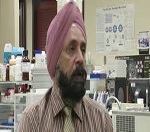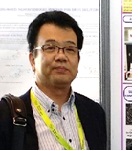Day 2 :
Keynote Forum
Mandip Singh
Florida A&M University, USA
Keynote: Nanoparticle constructs to overcome the barriers in lung cancer
Time : 10:00-10:30

Biography:
Mandip Singh completed his MSc and PhD in Biopharmaceutics from Dalhousie University, Canada respectively in1986 and 1989. He then worked with SynPhar Laboratories in Edmonton, Canada as a Group Leader, Drug Targeting from 1989-1993 and then moved to academia as an Assistant Professor, Pharmaceutics at Florida A&M University in 1993 and got promoted to Full Professor in 2002. Presently he is the Section Leader of Pharmaceutics at Florida A&M and has won many honors and awards such as Novapharm Award for the year 1989-1990 for excellence in Biopharmaceutics, AAPS Fellow award 2007, Davis Productivity Award from the State of Florida, 2009, 2011, 2015, Who’s Who in America 2008 and 2009, Research Excellence Award from FAMU, 2011. He was also selected as a Fulbright Fellow for the year 2014-2015. He has published more than 120 articles and papers in Biopharmaceutics and has five issued patents. He is a member for Controlled Release Society (CRS), American Association of Pharmaceutical Scientists (AAPS), American Association of Cancer Research (AACR), Society of Toxicology (SOT) and Society of Investigative Dermatology. Further he is the chair of the Dermatopharmaceutics Focus group at AAPS for the year 2014-2016
Abstract:
Lung cancer is the leading cause of deaths in the United States than any other disease. Non-small cell lung cancer (NSCLC) accounts for 85 percent of all lung cancers. Poor survival rates in NSCLC patients are due to limited efficiency of systemic or oral chemotherapy. Vascular endothelial growth factor (VEGF) over-expression is associated with poor survival. Recently, new approaches in the treatment of lung cancer with novel drugs that selectively inhibit tumor blood supply thus controlling cancer cell survival, proliferation and/or metastasis in combination with conventional anticancer or antiangiogenic drugs have generated clinical interest. DIM-C-pPhC6H5 (DIM-P), a c-substituted diindolylmethanes is novel anti-cancer agent. One of the objectives in my laboratory is to formulate tumor homing pegylated CREKA peptide coated nanolipid carriers of DIM-P and investigate its antitumor activity and antiangiogenic potential for treatment of lung cancer. Further, another objective in my laboratory is to overcome the stromal barriers for tumor penetration by using antifibrotic agents like Telmisartan in combination with nanoparticles. Our results have shown that agents like Telmisartan and Losartan play a significant role in enhancing tumor penetration by reducing collagen levels in tumors and also by inducing apoptosis.
Keynote Forum
Nobuhito Shibata
Doshisha Women’s College of Liberal Arts, Japan
Keynote: Polymer matrix supported drug delivery system: designing controlled-release formulations involving concept of nano-technology
Time : 10:30-11:00

Biography:
Nobuhito Shibata was born in 1962. After finishing a master course of clinical pharmacy at Kyoto Pharmaceutical University in 1986, He worked for Shiga University of Medical Science for 13 years as a hospital pharmacist. During this period, he got a PhD degree (Pharmaceutical Sciences) from Kyoto Pharmaceutical University. Subsequently, he changed his career and worked for Kyoto Pharmaceutical University for 6 years as an associate professor in the field of pharmacokinetics. In 2005, he was transferred to a higher post at Doshisha Women’s College of Liberal Arts as a professor of Faculty of Pharmaceutical Science. His research interests focus on the constructing drug delivery system using nano-particles.
Abstract:
Main purposes of drug delivery system (DDS) are improvement of drug absorption, controlled-release of drug and passive and/or active tissue targeting to maintain optimal drug levels in tissues. So called, all these concepts are for the sake of optimization of drug therapy. In regard to the controlled-release system, a large number of studies about it elsewhere in literatures, and numerous formulations have been provided by pharmaceutical industries on the market. On the other hand, progress in nano-technology has developed several ways to construct nano-device for DDS, and has enabled us to prepare DDS formulations which have more intelligent functions such as cancer or gene targeting. Nevertheless, as pharmaceutical additives, polymers which are derived from natural or artificial sources have important roles for designing DDS based on the nano-concept. In this keynote lecture, I’ll introduce my researches about construction of polymer matrix supported DDS, which are controlled-release systems, based on the nano-concept.
